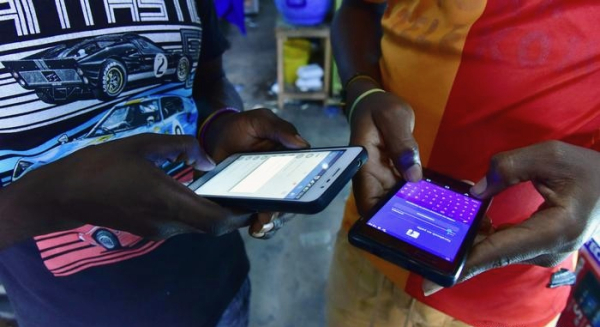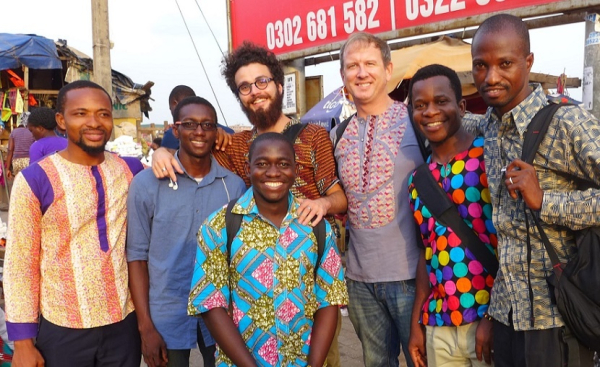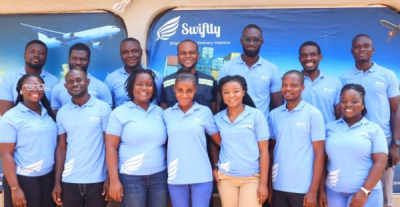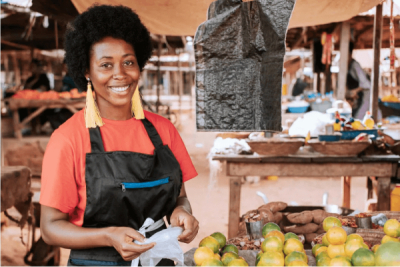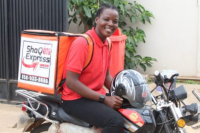
Solutions (581)
In Africa, and possibly in the rest of the world, instant messaging apps are getting more popular. Local entrepreneurs have decided to create alternatives to the foreign apps that have dominated the market up to now.
OnDjoss is an instant messaging app developed by a Cameroonian eponymous start-up. It allows users to chat through instant text messages, and audio and video calls.
"Ondjoss is an instant messaging app made by Africans for the world. It is about providing Africans with a powerful messaging app that they can identify with. The aim is to later compete with similar well-known apps worldwide but, we want to conquer Africa first,” indicates Ondjoss founder, Valere Tchapda.
The mobile app is available for Android devices only. Some users criticize it for being a carbon copy of WhatsApp but, Valere Tchapda says it is not. She explains that unlike other messaging apps (Whatsapp notably), other Ondjoss users can not access other users’ phone numbers in groups they belong to. They can only see usernames. With Ondjoss, users can also send heavy files of up to several gigabytes and save messages to recover later when they misplace their phones.
In 2022, a new feature was added to the app. The feature, called Kongossa, allows peer-to-peer messaging for enhanced privacy.
To register or create an Ondjoss account, users will need to provide their phone numbers and create pseudos. Then, they can chat with their contacts, who also have Ondjoss accounts. The personal data scandal that hit U.S firm Meta and its messaging app, WhatsApp notably, positively impacted OnDjoss userbase. It claims more than 125,000 users and Playstore data shows 100,000+ downloads.
Adoni Conrad Quenum
In Africa, access to conventional financing is most of the time difficult for SMEs and informal traders. Mosabi aims to facilitate that access and also improve its users’ business and financial literacy.
Mosabi is a tech solution developed by a Sierra Leonean eponymous start-up. It helps entrepreneurs, mainly from the informal sector, access financial and business information to manage their business and money better.
“We [...] use visual and audio cues that can reach low-literacy users. Not only does our training help users build practical skills and increase their income, but our lessons and economic incentives are also specifically designed to drive behavior change,” explained Mosabi co-founder and CEO, Chris Czerwonka.
Through its video content, users can study many subjects, including entrepreneurship, business, and financial literacy. Mosabi also uses gamified quizzes, surveys, and conversational agents to enhance the way courses are delivered while considering participants’ literacy to adjust its contents and exams.
“We believe we are creating unique and tangible value from learning, for people excluded from traditional educational pathways, and placing the control back into their hands as we help them understand and improve their creditworthiness,” Chris Czerwonka says.
The startup claims more than 20,000 users in Sierra Leone, Ghana, Kenya, Liberia, Paraguay, and Senegal. According to Czerwonka, within five years, it plans to launch in 20 global south countries and emerge as the “worldwide training platform of choice for lifelong learning aligned with global sustainable development” within ten years. To support its growth plan, it has already raised more than US$150,000.
Its Android app is not on PlayStore, the official app store for Android devices, but, it has already been downloaded more than 10,000 times from APKCombo.
Adoni Conrad Quenum
Access to medicines sometimes proves challenging in Africa, leading tech entrepreneurs to develop innovative solutions to address the various issues.
Phati is an e-health solution developed by Congolese start-up Valorigo, founded in 2018. It helps users check whether health products are available in their neighborhoods, compare prices, and get directions to the most appropriate pharmacies.
Users can access the solution through its web platform and contact chosen pharmacies on Whatsapp. Indeed, when looking for specific health products, they just have to visit the Phati web platform and input their location and the name of the product. They will then get redirected to a page listing the pharmacies selling products, their prices, and contact details. Once the user selects a pharmacy to buy from, he/she is redirected to WhatsApp to complete the acquisition.
To be listed on Phati, pharmacies have to register by providing their name, address, and contact details. Apart from Phati, Valorigo has developed several other e-health solutions.
In September 2022, it was selected as one of the 30 healthtech startups that will participate in the pan-African program Investing in Innovation (i3).
Adoni Conrad Quenum
The solution was developed to, among other things, ease access to health products for the more than 50% of French-speaking African patients who are still buying drugs on street corners.
Meditect is an e-health solution developed by an Ivorian eponymous start-up. It allows access to quality health products, helps locate the nearest pharmacies, and verifies the authenticity of products they purchase. The start-up, founded in 2018 by Arnaud Pourredon and Romain Renard, aims to digitalize the drug distribution chain in Côte d'Ivoire.
According to Arnaud Pourredon, Meditect was created to help Africa, which is experiencing an unprecedented demographic explosion, address challenges preventing access to quality medicines with digitalization.
Thanks to its mobile app -available for Android and iOS devices, the solution helps users access information on the health products they are prescribed. Provided they are logged in or signed in, they can easily check the prices of the products and the pharmacies where they are available.
The solution also requires pharmacists to create accounts before submitting their pharmacies. To avoid data loss in case of unforeseen events, the startup stores data both locally and on the cloud. Currently, it operates in Senegal and Côte d’Ivoire, claiming more than 50,000 patients and 1,200 pharmacies. It also partners with local and customs authorities to combat counterfeit drugs. It has for instance helped seize more than 3,000 drugs. Play Store data show its Android app has been downloaded more than 10,000 times. In September 2022, the healthtech startup was selected to take part in the pan-African Investing in Innovation (i3).
Adoni Conrad Quenum
The solution created in Ghana to facilitate freight transport across Africa has now taken on the international scene.
Swiftly is a digital solution developed by a Ghanaian eponymous startup founded in 2016. It allows its users -namely freight forwarders and traders- access to freight quotes and expert advice on customs regulations, and ships goods worldwide.
To use the solution, users have to visit its web platform and fill out a form with their freight details to get quotes from the startup’s network of freight forwarders. They can thus select the best quote, make payment online and wait for the freight to be delivered.
Air freights usually take between three and five working days against 30-40 days for sea freight and 1-2 days for road freights. For usual courier services, the delivery time is usually below three hours.
Let’s note that to get quotes and order freight or courier services, users will have to create their Swiftly accounts by providing personal information like name, surname, email, phone number, etc. Using their Swiftly accounts, users can also negotiate with other Swiftly users to co-lease containers for their shipments.
“It is a waste of space when someone has to ship a half-full container by sea, a half-full package by air, or hire a delivery service without fully utilizing the space in there. We aim to solve that by linking shippers to each other for them to share their extra space. Others also wish they could find someone to collaborate with to load a shipment, we are the matching platform for such people,” explained Swiftly co-founder Edem Dotse.
The startup, which claims rates up to 30% lower than the competition, went from shipping just 100 kilograms yearly to 500 tons monthly. According to Edem Dotse, it already ships goods from all over the world to countries like Ghana, South Africa, Burkina Faso, Kenya, Rwanda, Nigeria, the UK, the USA, Canada, Australia, and China.
Its plan is now to establish a physical presence in French-speaking West Africa, and East Africa. It also plans to introduce its business model in the United States, China, and Europe.
Adoni Conrad Quenum
The ongoing technological revolution has affected every economic sector, including the informal ones. Sabi is one of those solutions developed to solve some of the problems faced by those informal sectors.
Sabi is a B2B platform developed by a Nigerian eponymous startup, founded in 2020. It allows informal traders to seamlessly conduct business transactions.
Its services are accessible via an Android and iOS app. Using the app, informal traders can create their accounts, connect with other registered merchants and easily conduct business and get products delivered if needed.
The platform also allows informal traders to monitor their sales and get performance reports. It even allows access to loans to help traders recover from major problems. “Sabi ensures Merchants are allowed to grow and increase their revenue with services such as loans and access to the best product prices in the market,” its website explains.
It claims over 10,000 agents across Nigeria, with 200,000 merchants registered and over US$2 billion in sales. Play Store data show its Android app has been downloaded more than 10,000 times. The startup, which is also present in Kenya, wants to scale into other African countries in the coming years. For that purpose, in 2021, it raised US$6 million to support its growth.
Adoni Conrad Quenum
Fintech is currently the most popular in the African startup ecosystem. It attracts a significant portion of VC investments, encouraging tech entrepreneurs to unleash their creativity.
Fintra is a fintech solution launched, this year, by Senegalese start-up Orya Technologies. It helps employees face urgent needs by allowing them access to salary advances (up to 20% of salaries at a 6% interest rate) repayable within two weeks.
The fintech solution -which aims to help employees serenely go by their usual duties while waiting for the next payday- was developed as an answer to the challenges faced by employees when they exhaust their earnings before payday. Instead of wasting their time on paperwork all in a bid to collect bank loans repayable with a 12% interest, or turning to usurers, workers can simply apply for Fintra loans.
According to Oumar Diallo, founder, and CEO of Orya Technologies, loan requests are processed automatically but the startup keeps check to avoid disrupting companies’ finances.
Currently, the platform is in its beta phase. The phase, launched on September 15, 2022, is expected to be completed within two months. For the time being, the loans can be requested only by employees whose employers are enrolled in the program. For Oumar Diallo, the loan process is simple. Once participating companies set up accounts for each of their employees, those employees can request salary advances -via a mobile app- starting from the 15th of every month and receive the advances in their mobile wallets within one hour.
With Fintra, Orya Technologies targets an about XOF350 billion (US$520 million) market of 350 thousand workers (per company figures) in Senegal. It also targets the West African region and its four million former workers. To reach its goals, it bets on its main investor, Compagnie Générale sénégalaise d’ingénierie et d’investissement.
Adoni Conrad Quenum
The platform was launched earlier this year but, it has already secured 7-figure financing to get its revolutionary real estate project off ground.
Partment is a digital solution developed by an eponymous Egyptian startup. It allows users to buy second homes or part of them at attractive prices. The startup, founded by Nadim Nagui, Ahmed el Raggal and Chinmaya Das in 2022, has completed a US$1.5 million funding round to improve its infrastructure platform and deploy its minimum viable product (MVP).
By rolling out the beta version of its platform, the startup aims to gather enough user feedback to validate the project and the product before starting a lengthy and expensive development. "Partment is a new concept in Egypt and we believe it will change the way people buy and use real estate in the local and international market," said Nadim Nagui.
On the beta platform, users (upon registration) can browse the list of houses located mostly in vacation destinations and invest to either become the owner or co-owner of the desired property. When there are multiple co-owners for a property, the platform’s smart booking system sets a quota of days when so or so co-owner can use the property based on the amount invested and the number of co-owners. “Every co-owner has 41 nights of unbiased and algorithm-powered quota,” the startup explains. Co-owners can also sell their rights (or fractional ownership) in a property when they no longer need the property.
The proptech hopes it will quickly conquer Egypt and expand in the subregion thanks to the funds raised last September. "Aside from the financial support and expert advice, their trust in our business model will help us achieve our short-term and long-term goals and scale our business to the next level in Egypt and across the region," Nadim Nagui indicated.
Adoni Conrad Quenum
According to WHO, “every day, approximately 830 women die from preventable causes related to pregnancy and childbirth” and 99% of the deaths occur in developing countries. To prevent such deaths, in Senegal, a startup has developed a maternal health information platform.
Doom Yaye is a digital platform developed by an eponymous Senegalese startup. It allows new and expectant mothers access to maternal health information.
The platform is accessible only via its web interface where its blog posts inform on every topic related to pregnant and breastfeeding women. The posts highlight the various phases of pregnancy and what expectant women can expect during those phases. They also indicate the various development phases and expectations from childbirth to the baby’s eighth birthday.
Doom Yaye also has an online shop where users can buy baby items like clothes, shoes, books, toys, etc. It also allows parents to rent childcare and leisure items such as baby walkers, bathtubs, dishes, and high chairs. The rental period can go from 48 hours to six months and the start-up emphasizes that all rented items are disinfected.
To read maternal health information, users need no account. However, they need to register when they are moving to make purchases or rentals. In 2022, Doom Yaye won the national edition of the Orange Social Venture Prize, receiving a XOF5 million (US$7,405) check and validation for participation in the global round where it will compete with 17 other African and Middle Eastern countries.
Adoni Conrad Quenum
Competition is fierce in the start-up market in Africa. Tech entrepreneurs offer various solutions to facilitate residents’ living conditions in several sectors and areas. In Ghana, this start-up wants to conquer several sectors.
ShaQ Express is a digital solution developed by a Ghanaian eponymous solution. It allows users to use a range of services including e-commerce, food delivery last-mile delivery, and e-pharmacy.
The solution has a mobile application (available for Android and iOS devices), which gives users access to all the services offered.
The startup also allows users to become sellers or couriers. For that purpose, they need to register an account by providing the usual information. Couriers are usually approved fast and then, they are free to approve or reject any delivery or errand they are notified of.
Sellers on the other hand will have to wait for a call from a ShaQ Express agent to activate their accounts. They then receive hands-on training on the various ways to sell through the application once integrated. Once added to the platform, they receive order notifications and, if the products ordered are available, they can accept the orders, package them and wait for a ShaQ Express courier to pick them up for delivery.
The Android version of the mobile application has already been downloaded more than 5,000 times on Playstore. The startup has been selected along with 5 other Ghanaian startups to take part in the MEST Express accelerator program organized in partnership with Mastercard Foundation. The program will last 20 weeks and each of the selected startups will receive a check for US$5,000.
Adoni Conrad Quenum
More...
In major cities, waste management is a challenging task, particularly in Africa. The challenges led local entrepreneurs to implement tech solutions to facilitate the task.
Scrapays is a digital solution developed by an eponymous Nigerian startup. It allows households and firms to sell their recyclable materials. In fact, through the digital solution, the startup connects users -businesses and households namely- with its partners who register the users, collect the materials, and sort them. The agents then sell the sorted materials to Scrapays.
To reach even users without internet access, the solution is accessible via a USSD code. Anyone can then register either as a collector, an agent, or an individual seller and discuss waste management issues.
The startup claims it collected over 150 tons of solid waste in 2020, generating US$60,000 from them. The startup expects to earn more in the coming years with the creation of its service that allows individuals to set up and develop their waste recycling micro-enterprises. It is among the five startups selected for this year’s edition of the OceanHub Africa accelerator program.
Adoni Conrad Quenum
Demand for big data is growing in several sectors given its ability to help improve efficiency. A Mauritian startup is using it to revolutionize SMEs’ marketing strategies.
Rwazi is a digital solution developed by a Mauritian eponymous start-up. It allows companies to track their competitors using various data collected on the ground.
The startup behind the app was founded by Joseph Rutakangwa (photo, right) in 2018 in Mauritius. But, it is also operational in Uganda, Zambia, and Rwanda.
Thanks to its mobile app and its part-time staff, it collects data on various brands, markets, and sales points. The collected data allow its customers to monitor the evolution of competitors’ pricing strategies in real-time, after due registration.
For Joseph Rutakangwa, “companies subscribe to activate the cycle where they want to optimize distribution.” “For example, you are Coca-Cola, and you subscribe for us to provide you a live feed on the availability, visibility, and pricing of Coca-Cola versus Pepsi in Lagos, throughout the year. With this, you list and restock at speed to increase market share,” he illustrated.
In addition to giving clients the ability to track various data in real-time, real-time analytics and predictions allow the said clients to decide when to adjust their marketing policy. Rwazi employs more than 20,000 mappers in 50 countries in Africa, South Asia, and the Americas to perform reliable and relevant analyses for its clients. It also works with more than 500 companies. "We give small and medium-sized businesses [...] direct access to [...] customers’ psychographic details that can help [...] determine how to best serve them,” the startup explains on its web platform.
Adoni Conrad Quenum
Despite public authorities, associations, and organizations’ efforts, access to healthcare is still challenging in Africa. The various solutions developed by start-ups are proving to be interesting alternatives.
Appy Saude is a digital platform developed by an Angolan eponymous healteth startup. It allows users easy access to pharmacies and healthcare centers when needed. With its digital solution, the healthtech startup (founded in 2017) aims to quickly connect people to healthcare professionals, medicines, and information by leveraging digital tools.
“We are trying to improve accessibility to healthcare services using the digital tools we have available today. [...] Our vision is to connect everyone to our health service, which is what most NGOs and governments are working for,” said CEO and co-founder Pedro Beirao (photo, right) in 2021.
Through its mobile app (available for Android and iOS devices), users can create their accounts by providing the usual information: name surname, email, and password. Then they can access all the services offered by Appy Saude.
The app lists health and beauty products, clinics, healthcare centers, and laboratories. Users can view the feedback and ranks given by fellow users to healthcare centers, clinics, and laboratories. That way, they can choose which healthcare center to go to, based on other users’ experiences.
To reach a wider audience in Angola, the healthtech startup formed a strategic partnership with telecom operator Unitel. “In terms of expansion, we see mobile operators as an important part of our growth, and the digitization of health services. They have coverage everywhere, they are looking for solutions that people can use to access healthcare or other digital services, and they can help collect data on pharmacies and doctors on our open platform,” Pedro Beirao explains.
In 2019, Appy Saude successfully raised US$1 million to expand into Rwanda and South Africa. In February 2019, it was selected to present its solution at the Africa Startup Summit in Kigali. The following year, it won the ITU Virtual Digital World SME Awards.
This year, it is one of the 30 African start-ups selected to participate in the pan-African program "Investing in Innovation (i3)" funded by the Bill and Melinda Gates Foundation. On Playstore, its solution has already been downloaded more than 50,000 times.
Adoni Conrad Quenum
In recent years, the number of streaming apps has shot up in Africa but local old-school songs are usually left out. A Congolese startup is offering an interesting solution.
Baziks is a digital solution developed by a Congolese eponymous startup. It allows Android users access to old and new Congolese songs. The startup behind the solution was founded by Baya Ciamala (photo) in 2016. However, it was incorporated in 2019 and launched to the public in 2021.
“Baziks is the first local music streaming app that aims to fight piracy and promote youth entrepreneurship. We support artists by educating the population and encouraging them to stop buying pirated MP3 music,” explains Baya Ciamala.
Once they download the Android app and register an account, they can browse the feature but they will not be able to listen to the available songs. They can listen to music by purchasing a subscription or buying the “pass miziki” via Orange Money. Its subscriptions range from US$0.15 (daily) to US$0.75 (weekly) and US$2.99 (monthly). Once subscribed, users can access and listen to the music index (with or without ads) and customize their interface.
The “Pass miziki” is a code card that allows access to the index and lets users listen to the songs on the platform. The daily pass costs US$0.1, while the weekly is US$0.7 against US$2.99 for the monthly. They can be ordered online and delivered (physical or electronic cards) for free anywhere in DRC.
There are also African songs on the platform but those by artists from the two Congos are predominant.
According to Play Store data, the app has already been downloaded more than a thousand times. In 2021, the start-up won the DRC edition of the Orange social venture competition, bagging a US$6,000 check.
Adoni Conrad Quenum


